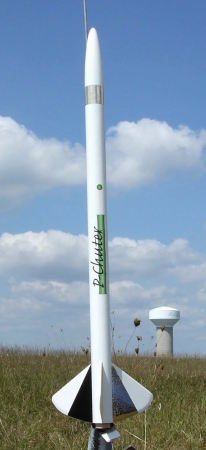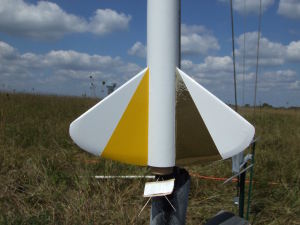| Construction Rating: | starstarstarstarstar |
| Flight Rating: | starstarstarstarstar |
| Overall Rating: | starstarstarstarstar |
| Diameter: | 0.98 inches |
| Length: | 20.50 inches |
| Manufacturer: | Red River Rocketry  |
| Skill Level: | 1 |
| Style: | Contest, Sport |

Brief:
While this is a basic 3-fin and nose cone design, the rounded fins and cool trim make it visually appealing. It also
boogies up to pretty impressive altitudes on 18mm motors.
Construction:
The parts list:
- Balsa nose cone
- BT-50 body tube (17")
- 50/20 centering rings
- BT-20 motor tube
- 20/5 thrust ring
- metal clip
- laser-cut balsa fins
- elastic shock cord
- 1/8" lug
- mylar chute
- waterslide decal
- Monokote trim
Parts were all very good quality. In particular, the body tube had hardly a trace of spiral, making finishing extremely easy. Even the bag's header card was good quality color reproduction.
Somehow I've managed to not get around to building any Red River Rocketry kits so far, and I decided to correct that by promoting this kit to the front of the build queue. I'm glad I did, as the kit is well designed and a quick and easy build. I had the whole thing done and ready for finishing in about 30 minutes and would rate it a skill level 1 kit.
Jim Gartrell did a fine job reviewing the construction steps, and there's not much I can add to them given the simplicity of the design. I will point out that the released version of this kit includes instructions that were printed out on high quality glossy paper. That's probably a bit overkill but certainly the nicest paper I've seen in a kit.
While I do like the shape of the fins, the suggested airfoiling is a bit of a nuisance. Rounding the leading edge is pretty easy, but getting a nice taper on the swooping trailing edge requires a good sanding block and steady hand.
As long and rugged as this is, I couldn't help comparing it to the Mercury Atomizer (released later than the P-Chuter) and wondering if it wouldn't do just fine on a 24mm with 18mm adapter for lower flights.
I normally don't bother to comment on the parachute in reviews other than listing the material, but did want to point out that the parachute in this was a very nice red Mylar and cut truly round, with 8 attachment points and ample shroud line lengths of 18+18 per paired line. Each line was attached by punching a hole in the Mylar and securing them by a pair of taped paper reinforcements, so I would not consider this sweet chute a very durable one. I generally prefer higher tack tape disks to attach shrouds to the surface of the chute rather than through a hole. Still, I'd rate the chute nicer than the average chute.

Finishing:
I went with a pretty quick and easy finishing technique. I coated the nose cone with Elmer's Fill 'n' Finish, watered
down slightly so that I could smear it on with my finger. Once dried, I sanded down with 220 then 400 grit sandpaper,
and it was perfect.
Body tube got nothing, as I felt the primer would probably take care of what little spirals I found. Fins got same Fill 'n' Finish treatment and were clamped down overnight to avoid warping.
For the paint scheme, I went dirt simple--a coat of gray primer base, mostly sanded down, mainly just to confirm no major grains or spirals left. I followed up with a coat of white primer, sanded down with wet 600 grit, then two coats of Rustoleum gloss white.
Accent color is conveniently managed via adhesive Monokote--black, gold and yellow for the fins, and a gold band on the tube near the cone. A waterslide decal completes the trimming.
After paint and decals, I weighed my finished rocket at 1.24 ounces versus the kit's listed weight of 1.25, one of the few times I've actually come in at or near the manufacturer's weight.
Construction Rating: 5 out of 5
Flight:
Fearing that a C6 would send this out of our park (plenty of thermal action on our field that day, plus 8-10 mph
winds), I went with a B6-4. The recommended delay is a -6, but I was a little low on -6s and wanted to hoard my last
few packs for competition flights. The boost was absolutely perfect, straight as an arrow and no spin at all. The -6
delay would definitely have been better, as this was still clearly climbing a bit when the -4 popped the chute.
Recovery:
The mylar chute deployed fine, was a good size for this bird, and held up to the early deployment just fine. So far
so good with those reinforcements...
Flight Rating: 5 out of 5
Summary:
I hardly ever rate a rocket a full 5 across the board, but I really can't find anything to knock on this one. A very
nice flier, looks sharp, and I especially like the use of the Monokote trim. The parts were all very good quality.
In reviewing the other reviews and comments I'd seen, while I think this could certainly work well as a "qualified flight" candidate in 18mm parachute or streamer duration contests, I'd caution against considering this a true competitor model. It's overly long, quite heavy, and while the BT-50 could hold a big thermal-sucking chute, you won't get nearly as high a boost from this as from something like an ASP Hang Time kit. Buy this kit, build it, and have a blast sport flying it, but don't get your hopes up trying to win an NAR contest with it.
Overall Rating: 5 out of 5
Other Reviews
- Red River Rocketry P-Chuter By James Gartrell
Brief: The P-Chuter is a very easy to build single stage rocket that looks fantastic and flies great! I got my kit from John as a beta test kit. The rocket stands a little over 20" tall, flies on 18mm motors, and recovers by parachute. In my opinion, the rocket actually looks a lot better than it does on the web page. John has appropriately classed this rocket as a &quo ...
 |
 |
Flights
Sponsored Ads
 |
 |











